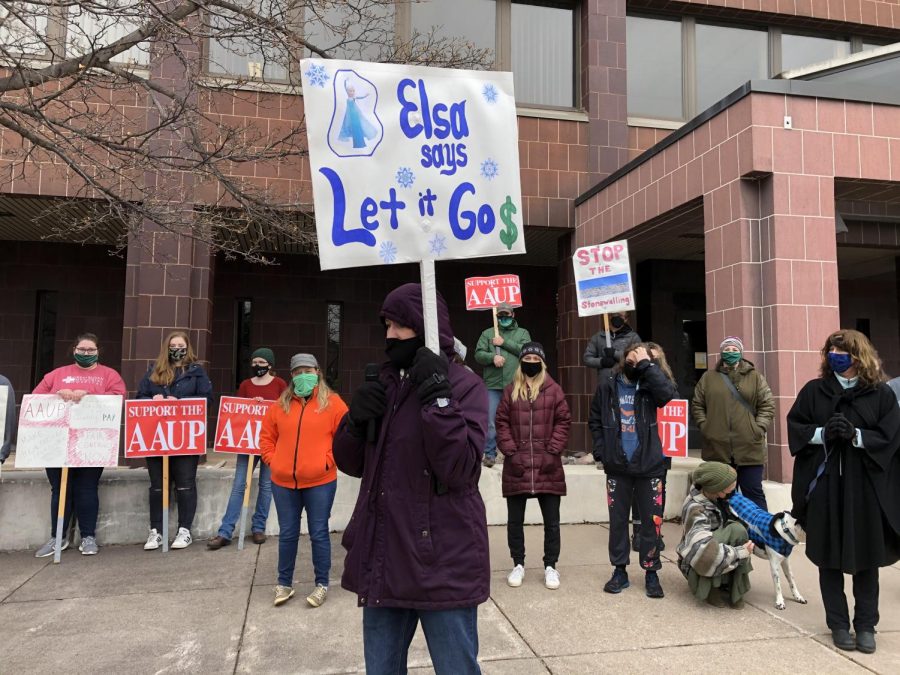NMU faculty continue to work without contract
Photo courtesy of Dwight Brady LET IT GO—During the Winter 2021 semester, community members gathered to rally from Jamrich to Cohodas Hall in response to the halt on financial negotiations.
August 23, 2021
On July 1, 2021, the one-year collective bargaining agreement written during the COVID-19 pandemic expired. Faculty at NMU have since been working without a contract, though under Michigan law the terms and conditions in the expired contract have to be maintained as part of a status quo. What this means is that while seeking an agreement on a new contract, faculty are able to continue teaching, researching and serving students.
The previous contract ended in 2019 shortly before COVID-19 as the NMU American Association of University Professors were bargaining about their next contract with the university. Due to the unprecedented circumstance, NMU-AAUP agreed to take pay cuts for the health of the university. This meant cuts to summer pay, overload pay and professional development funds.
Jon Barch, information officer for NMU-AAUP and assistant professor in the psychology department, said that the union also agreed to take a 0% increase, a flat salary, for the year. All of these cuts were related to COVID-19.
“And what [NMU] came at us this year, after having all of their COVID financial problems solved by the federal and state governments, they came to us with our cuts being the base now,” Barch said.
According to Barch, faculty were under the impression that these cuts were temporary, wishing to start negotiations based on the 2019 contract that had ended before the start of the pandemic. Instead of giving faculty a salary increase, the university would give faculty one-time bonuses.
“What that means is, I’ll give you your salary and a little bit of an extra percent of your salary as a one-time bonus money, but your salary stays flat. So next year, any more money that you get comes from that same base, so your salary is never going up,” Barch said. “That frustrated a lot of people because we need our salaries to just kind of gradually go up with inflation. At the very least, when the university is doing well, at the very least we need cost of living increases, like any other workforce needs.”
Compared to 11 Michigan public universities, NMU comes in at second to last with faculty being paid 9.26% lower than the average. This data comes from salary report data to the NMU-AAUP. While the Board of Trustees may congratulate the administration for keeping expenditures low, this rate of pay will erode the quality of instruction at this institution, Barch said in an article written in April.
Since July 19, NMU-AAUP and the university have been under mediation with progress being made towards getting a mutually acceptable agreement between faculty and Northern. Dwight Brady, president of NMU-AAUP and professor in communications and media studies at NMU, said that it has been a long summer and while both parties would have preferred to reach a deal several months ago, the union is committed to getting a fair contract.
“It is important to remember that mediation is not binding, but it does provide a mechanism to keep talks moving toward a common ground,” Brady said.
According to an article by Brady on the NMU-AAUP website explaining the current situation, if health insurance costs increase during the interim period, faculty would be responsible for paying this out of pocket. The lack of contract affects faculty more than just in the classroom but at home as well.
“It’s natural to worry about how the lack of contract, or agreeing to a bad contract, affects us each personally, but the power of a union is that we can use our collective voice to fight to protect the group as a whole, particularly the most vulnerable among us – contingent faculty and untenured faculty and those folks we hope to hire in the future,” Jennifer Howard, professor in the English department at NMU, said.
As of Aug. 20, Derek Hall, chief marketing officer for NMU, said that the administration remains optimistic for a timely resolution to the contract negotiations and moving forward with a productive fall semester.



























